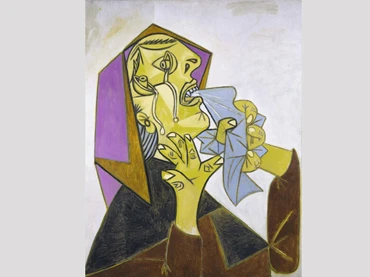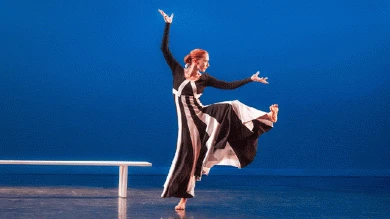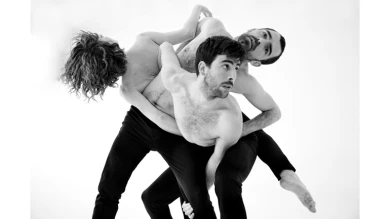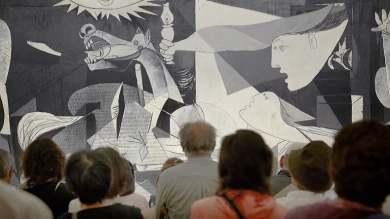-
Saturday, 25 March
Monster Institutions
17:30 hrs. Gerald Raunig. Technecologies. Milieus, Midstreams, Monsters
18:30 hrs. Florencio Cabello. Notions of Public in Collective Intelligence
19:30 hrs. Roberta Da Soller (S.a.L.E., Venice), Kelly Mulvaney (Transform-eiPCP, Berlin and Vienna) and Manuela Zechner (Barcelona). Moderated by: Raúl Sánchez Cedillo. European Cities, from Care and Shelter to Fear, War, and Debt
21:00 hrs. Debate with the session participantsParticipants:
Florencio Cabello has a PhD in Communication Studies and is a lecturer at the University of Málaga. His teaching and research focuses on ways of forming cooperatives inspired by the free software and culture movements, under the perspective of constructing a commons in communicative and cultural domains. He is coordinator of the Medialab-Prado project Traducciones del Laboratorio del Procomún (Translations of the Commons Laboratory).
Roberta Da Soller is an activist and member of the collective which operates S.a.L.E. Docks, an independent space of contemporary art and cultural practices in Venice which has been running since 2008. S.a.L.E. Docks programmes seminars, exhibitions, research projects, workshops and public actions that seek to create an environment in which art and culture are removed from the market value logic.
Kelly Mulvaney is an anthropologist, translator and activist. She is a member of eiPCP and the editorial board for transversal texts. Furthermore, she is a professor at the Faculty for Cultural Studies at the Leuphana University of Lüneburg, and actively participates in the networks of transnational anti-austerity movements in Europe.
Gerald Raunig is a philosopher and art theorist. He is a lecturer at Zürcher Hochschule der Künste (Zurich), and is co-editor of eiPCP and its online publication transversal text. His most recent publications include Producción cultural y prácticas instituyentes. Líneas de ruptura en la crítica institucional (2008), Mil máquinas. Breve filosofía de las máquinas como movimiento social (2008), Fabbriche del sapere, industrie della creatività (2012), and DIVIDUUM. Machinic Capitalism and Molecular Revolution (2016).
Raúl Sánchez Cedillo is a philosopher, activist and translator. He has collaborated with the Universidad Nómada and is currently a member of Fundación de los Comunes. He has also edited and translated theorists such as Paolo Virno, Antonio Negri, Felix Guattari, Luce Irigaray, Yan Moulier-Boutang and Luc Boltanski and Eve Chiapello into Spanish, and some of his writings appear in the book Producción cultural y prácticas instituyentes. Líneas de ruptura en la crítica institucional (2008) and in the prefaces to different essays by Antonio Negri and Paolo Virno.
Manuela Zechner is a researcher and independent cultural worker. Her work revolves around migration, micropolitics, care and pedagogy, with an emphasis on social movements. She is the coordinator of Future Archive (Intermediae-Matadero, Madrid), the Project for Radical Collective Care Practices, alongside Julia Wieger and Bue Rübner Hansern, and the free radio programme Sounds of Movement (Radio Orange, Radio Helsinki and live streaming). She has also worked as a lecturer at the Queen Mary University of London. -
Sunday, 26 March
The Artist in the City-Brand
17:30 hrs. Rogelio López Cuenca. In the Genius City
This presentation will lead on to a workshop with the artist and Elo Vega.
18:30 hrs. Isabell Lorey. Precarization, Indebtedness, Giving Time
19:30 hrs. Debate with the session participantsParticipants:
Rogelio López Cuenca. Artist. A member of the former direct action collective Agustín Parejo School between 1982 and 1984, his work stands at the crossroads between visual poetry, archival research and public intervention, exploring the relationships between art, memory and ideology. Málaga/Guernica 951 (2017), Ciudad Picasso (2011), Malagana (2000) and Sobrevivir a Picasso (2012) are some of his projects under construction and centre on contemporary interpretations of Pablo Picasso. He has exhibited at the Museo Reina Sofía, IVAM, MACBA, MUSAC, CGAC and Artium, among other institutions.
Isabell Lorey is a professor of International Gender Politics in the Institute for Political Science at the University of Kassel. She has taught feminist and post-colonial theory at the University of Humboldt, Berlin, and at the Universities of Vienna and Basel, and is also a member of eiPCP and co-editor of its online publication transversal text. She conducts research into the precariousness of work and life in neoliberal society, social movements, democracy and representation. Her most recent publication is Estado de Inseguridad. Gobernar la Precariedad (2016).
Elo Vega is an artist and researcher. Her work addresses social, political and gender issues through art projects which are at once cultural critique devices and a political instrument. In recent years she has worked with the artist Rogelio López Cuenca in workshops and collective projects related to history, memory and monumentalization as an element of ideological control, for instance Gitanos de papel (Cultural Centre of Spain in Montevideo), Historia de dos ciudades/Saharawhy (Museo de Arte Contemporáneo, Santiago de Chile), Efigies y fantasmas (Museo de Huelva) and Granada. Guía monumental (Centro José Guerrero).
Picasso in the Monster Institution
Art, the Culture Industry and the Right to the City
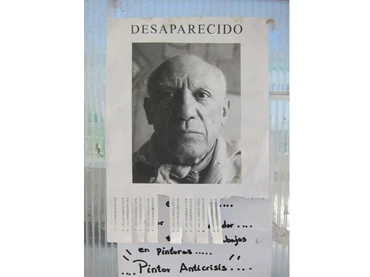
Held on 25 Mar 2017
Picasso in the Monster Institution. Art, the Culture Industry and the Right to the City strives to create distance from the predominant sense of celebrations and large-scale cultural commemorations which, in understanding art as an attractive resource, place history and artistic experience inside a frame with exclusive ties to tourism and urban leisure. It also calls into question these logics and explores possible alternatives.
This seminar unfolds inside the context of Midstream, a European network of university and institutional research into new audiences and devices of cultural mediation, comprising eiPCP (the European Institute for Progressive Cultural Policies), Museo Reina Sofía, and the Latvian Center for Contemporary Art, and seeks to reflect on and debate the role of culture and art in those social movements that vindicate uses of urban space outside a city model which looks towards art to strengthen tourist imaginaries, thus conditioning its institutions and reception.
The recognition of Picasso’s work is one of the best examples to analyse the contradictions and complexities of these logics. Today, the work of the artist from Málaga is broadly appreciated and disseminated, yet, equally, such a reception cements stereotypes associated with the heroic and fetichized idea of artistic avant-garde movements and their most unrelenting myths, for instance the originality, brilliance and autonomy of art. These values obscure one of the 20th century’s most complex bodies of work.
How can the contemporary city fight against this integration of art, and its audiences and institutions, in the service economy and recover the potential of one of the most challenging oeuvres from the avant-gardes in its historical scope? What are the devices and anomalous or “monstrous” institutions which are able to place the work in a space which is alien to this integration? The seminar sets out to reflect on these questions via two round-table discussions and a workshop on the monumental imagary of Picasso and the contemporary city, conducted by Rogelio López Cuenca and Elo Vega, which will begin at the close of the lectures and shall be expanded upon in the future. The first session will debate monstrous institutionalism’s modes of relationship, calling upon different European networks and spaces (S.a.L.E., Venice; Transform-eiPCP, Berlin and Vienna; and La Invisible, Málaga), and theorists specialised in testing mediation experiments with these instituent machines. The second analyses the relationship between art and gentrification through the uses and abuses of Picasso’s work, putting forward a model of artistic experience which eludes the so-called creative industries and economies.
Framework
Midstream. New Ways of Audience Development in Contemporary Art, inside the Creative Europe programme
Organised by
eipcp (European Institute for Progressive Cultural Policies), Museo Reina Sofía and La Invisible


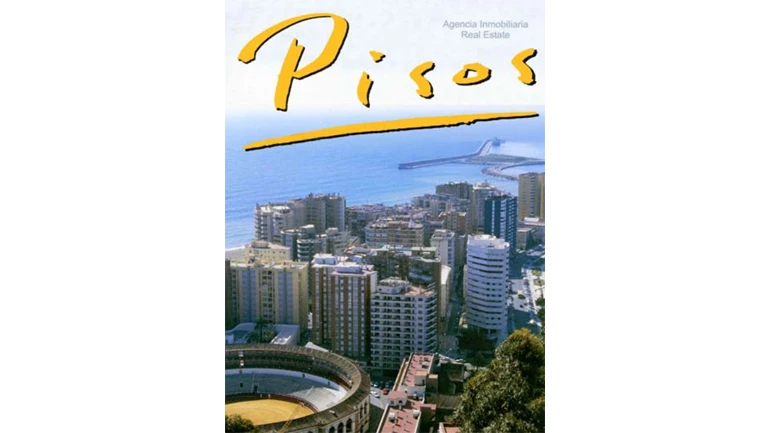
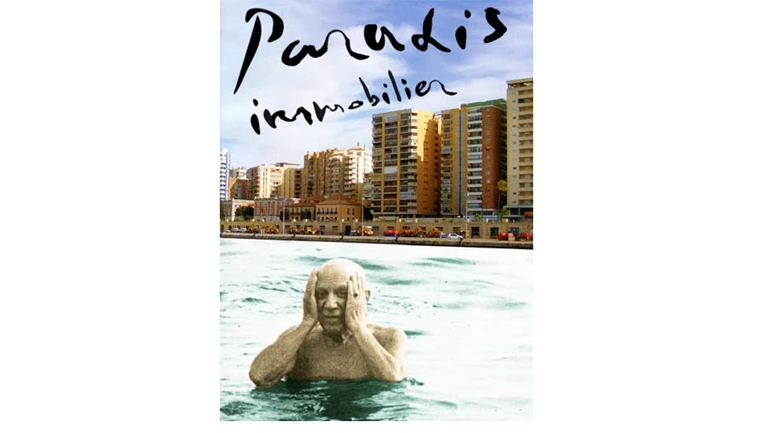
Más actividades

Difficulty. Forms and Political Effects of Deviation in Writing and Contemporary Art
23 February – 14 December 2026 – Check programme
Difficulty. Forms and Political Effects of Deviation in Writing and Contemporary Art is a study group aligned towards thinking about how certain contemporary artistic and cultural practices resist the referentiality that dominates the logics of production and the consumption of present-day art. At the centre of this proposal are the concepts of difficulty and deviation, under which it brings together any procedure capable of preventing artistic forms from being absorbed by a meaning that appears previous to and independent from its expression. By ensuring the perceptibility of their languages, difficulty invites us to think of meaning as the effect of a signifying tension; that is, as a productive and creative activity which, from the materiality of art objects, frees aesthetic experience from the representational mandate and those who participate in it from the passiveness associated with tasks of mimesis and decoding.
The economy of the referential norm translates the social logic of capitalism, where insidious forms of capturing subjectivity and meaning operate. In the early 1980s, and adopting a Marxist framework, poet Ron Silliman highlighted how this logic entailed separating language from any mark, gesture, script, form or syntax that might link it to the conditions of its production, rendering it fetichised (as if without a subject) and alienating its users in a use for which they are not responsible. This double dispossession encodes the political strategy of referential objectivity: with no subject and no trace of its own consistency, language is merely an object, that reality in which it disappears.
The political uses of referentiality, more sophisticated today than ever before, sustain the neoliberal-extractivist phase of capitalism that crosses through present-day societies politically, economically and aesthetically. Against them, fugitive artistic practices emerge which, drawing from Black and Queer studies and other subaltern critical positions, reject the objective limits of what exists, invent forms to name what lies outside what has already been named, and return to subjects the capacity to participate in processes of emission and interpretation.
Read from the standpoint of artistic work, the objective capture of referentiality may be called transparency. Viewed from a social contract that reproduces inequality in fixed identity positions, transparent in this objectivity are, precisely, the discourses that maintain the status quo of domination. Opposite the inferno of these discourses, this group aims to collectively explore, through deviant or fugitive works, the paradise of language that Monique Wittig encountered in the estranged practices of literature. For the political potency of difficulty — that is, its contribution to the utopia of a free language among equals — depends on making visible, first, its own deviations; from there, the norm that those deviations transgress; and finally, the narrowness of a norm which in no way exhausts the possibilities ofsaying, signifying, referring and producing a world.
From this denouncement of referential alienation, fetishisation and capture, Difficulty. Forms and Political Effects of Deviation in Writing and Contemporary Art turns its attention to the strategies of resistance deployed by contemporary artists and poets. Its interest is directed towards proposals as evidently difficult or evasive as those of Gertrude Stein, Lyn Hejinian, Theresa Hak Kyung Cha, Kameelah Janan Rasheed, Kathy Acker, María Salgado and Ricardo Carreira, and as seemingly simple as those of Fernanda Laguna, Felix Gonzalez Torres and Cecilia Vicuña, among other examples that can be added according to the desires and dynamics of the group.
The ten study group sessions, held between February and December, combine theoretical seminars, work with artworks from the Museo Reina Sofía’s Collections and exhibitions, reading workshops and public programs. All these formats serve as spaces of encounter to think commonly about certain problems of poetics — that is, certain political questions — of contemporary writing and art.
Difficulty. Forms and Political Effects of Deviation in Writing and Contemporary Art inaugurates the research line Goodbye, Representation, through which the Museo Reina Sofía’s Studies Directorship seeks to explore the emergence of contemporary artistic and cultural practices which move away from representation as a dominant aesthetic-political strategy and redirect their attention toward artistic languages that question the tendency to point, name and fix, advocating instead for fugitive aesthetics. Over its three-year duration, this research line materializes in study groups, seminars, screenings and other forms of public programming.

CLINIC 2628. A Community of Writing and Research in the Arts
February – October 2026
Clinic 2628 is a project which supports and brings together writings which stem from the intention to offer a space and sustainable time for research work in art and culture. Framed within an academic context which is increasingly less receptive to the forms in which thinking happens and is expressed, the aim is to rescue the academic from its neoliberal trappings and thus recover the alliance between precision and intuition, work and desire. A further goal is to return writing to a commons which makes this possible through the monitoring of processes and the collectivisation of ideas, stances, references and strategies.
The endeavour, rooted in a collaboration between the Museo Reina Sofía’s Studies Directorship and the Artea research group, via the i+D Experimenta project, is shaped by three annual editions conceived as spaces of experimentation, discussion and a demonstration of writings critical of what is put forward by today’s academia.
What forces, forms and processes are at play when writing about art and aesthetics? In academia, in museums and in other cultural institutions, the practice of writing is traversed by productivist logics which jeopardise rhythms of research and experimentation. The imposition of both scientism inherent in the structure of “the paper” and the quantifying of results which demand a criterion of quality and visibility sterilise and smoothen, from the outset, the coarseness that is particular to writing understood from the concrete part of language: phonic, graphic, syntactic and grammatical resistance connecting the language user to the community the language unites and activates. They also sterilise the roughness enmeshed in the same desire to write, the intuitive, clear and confusing pathways that once again connect the writer to those reading and writing, participating in a common good that is at once discovered and produced.
The progressive commercialisation of knowledge propelled by cognitive capitalism moves further away from the research and production of knowledge in artworks and artistic languages and practices. The work of curators and archive, criticism, performances and essays formerly saw a horizon of formal and emotional possibilities, of imagination that was much broader when not developed in circumstances of competition, indexing and impact. Today, would it be possible to regain, critically not nostalgically, these ways; namely, recovering by forms, and by written forms, the proximity between art thinking and its objects? How to write in another way, to another rhythm, with no more demands than those with which an artwork moves towards different ways of seeing, reading and being in the world?

Cultural Work
Thursday, 12 February 2026 – 5:30pm
This series is organised by equipoMotor, a group of teenagers, young people and older people who have participated in the Museo Reina Sofía’s previous community education projects, and is structured around four themed blocks that pivot on the monstrous.
Session number two looks to approach film as a place from which cultural work is made visible and processes of production engage in dialogue with artistic creation. From this premise, the session focuses on exploring how audiovisual content is produced, assembled and distributed, from the hands that handle the images to the bodies that participate in its circulation. The aim is to reflect on the invisible effort, precarity and forms of collaboration that uphold cultural life, that transform the filmic experience into an act that recognises and cares for common work.

Alberto Greco. Viva el arte vivo
Tuesday, 10 February 2026 – 7pm
In conjunction with the opening of the exhibition Alberto Greco. Viva el arte vivo, Fernando Davis, the show’s curator, and Amanda de la Garza, the Museo Reina Sofía’s deputy artist director, will converse in the Nouvel Building’s Auditorium 400 on the life and work of the Argentinian artist, a core figure in experimental avant-garde art.
The title of both exhibition and conversation originates from the proclamation “Long Live Arte Vivo” Alberto Greco (Buenos Aires, 1931— Barcelona, 1965) disseminated around the streets and on the walls of Rome. For Greco, arte vivo was an art of the future, an art based on a set of irreverent and untimely gestures, of adventures open to unpredictability melding with life, and which began in 1962, prior to his coining of the term “vivo-dito”. In his Manifiesto dito dell´arte vivo (Dito Arte-Vivo Manifesto), which he pasted on the walls of Genoa, Greco encouraged new contact “with the living elements of our reality: movement, time, people, conversations, smells, rumours, places, situations”. He would also burst into the everyday of Madrid’s streets as he convened a “vivo-dito moment”, culminating in the burning of a canvas painted collectively in Madrid’s Lavapiés neighbourhood.
In addition to founding arte vivo, Alberto Greco was an informalist painter, a queer flâneur, a poet and sometime actor. This intense journey of Greco’s life and art is closely connected to the migrant route he embarked upon in 1950 in Buenos Aires, taking in Atacama and Humahuaca, Paris, Rio de Janeiro, São Paulo, Genoa, Rome, Madrid, Piedralaves, New York and Ibiza and ending abruptly in Barcelona, where he took his own life shortly after writing his final great work, the novel Besos brujos (Bewitching Kisses, 1965).
These inaugural conversations, part of the main working strands of the Museo’s Public Programmes Area, aim to explore in greater depth the exhibition narratives of the shows organised by the Museo from the perspective of artists, curators and specialists.
![Basel Abbas y Ruanne Abou-Rahme, At Those Terrifying Frontiers Where the Existence and Disappearance of People Fade Into Each Other [En esas fronteras aterradoras donde la existencia y la desaparición de personas se disuelven entre sí], 2019](https://recursos.museoreinasofia.es/styles/small_landscape/public/Colecci%C3%B3n/abbasabourahme.png.webp)
Gaza and Aestheticide
Tuesday February 10, 2026 – 16:00 h
“This seminar examines the systematic destruction of Palestinian collective sensibility — what we might call ‛aestheticide’ — that has accompanied Israel’s genocide and ecocide in Gaza, and considers the conditions of artistic practice in its aftermath. Over more than two years, the demolition of universities, archives, museums, and libraries has not only erased cultural and intellectual infrastructure but has also targeted the very possibility of representation itself. The destruction of a people has been accompanied by the destruction of their image, their history, and their capacity to be known: reportage, scholarship, and cultural memory have been deliberately undermined, with media institutions, universities, and museums often complicit in this repression. Gaza consequently functions as a rehearsal space for a possible global future — of fascism, post-liberal authoritarianism, militarized borders, and AI-enabled warfare —, a laboratory for an emerging world order. What, then, becomes of critical analysis and resistance under these conditions? And what becomes of aesthetics and politics?”
—T.J. DemosThis seminar takes place thanks to the art historian’s invitation to Spain by the Miró Foundation. In the context of the museum, it engages in dialogue with a broader line of work on the climate emergency and decolonial perspectives developed within the Museum of the Commons project (2023–2026) of the L’Internationale network, of which the Museo Reina Sofía is a member; as well as with some of the questions that animate the study group Aesthetics of Peace and Desertion Tactics. Finally, it is also embedded in a wider strategy of support for and commitment to the artistic and discursive practices of Palestinian artists and cultural practitioners, most clearly reflected in the TEJA network.

